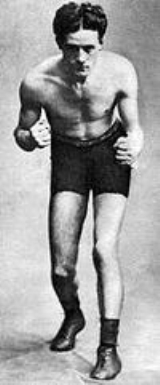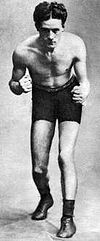
Jim Driscoll
Encyclopedia
James "Jim" Driscoll commonly known as Peerless Jim (15 December 1880 – 30 January 1925) was a Welsh
boxer
who learned his trade in the boxing ring and used it to fight his way out of poverty.
Born on Ellen Street, Newtown, Cardiff
in 1880, Driscoll gained fame for winning the coveted Lonsdale belt
in 1910. Jim never forgot his roots; he was a faithful supporter of his church, remained close to his community, and had great affection for the Nazareth House Orphanage, for whom he once gave up the chance of becoming Featherweight
Champion of the World.
in London, a points decision win over Boss Edwards. That year he also suffered his first defeat in a return bout against Mansfield, losing by points in a ten round clash.
On the 26 February 1906, Driscoll took the British Featherweight title by defeating Joe Bowker in a 15 round contest at the National Sporting Club. He undertook four more fights before his first defence, which included beating Mansfield by knockout in their fourth meet. His first title defence, held on 3 Jine 1907, was a copy of his title win, another contest with Bowker at the National Sporting Club in Covent Garden. This time it was a twenty round match and Driscoll stopped his opponent in the seventeenth via a knockout.
The 24 August 1907 is recorded as a non-contest fight between Driscoll and fellow Welshman Freddie Welsh
. Boxing historians such as Andrew Gallimore have cast doubt on this being a professional contest and instead a display fight at a fairground. Welsh supposedly took advantage of this situation and attacked Driscoll with kidney and rabbit punches. Driscoll never forgave his former friend for taking such liberties.
On 24 February 1908, Driscoll faced New Zealander Charlie Griffin
for the vacant Commonwealth Featherweight title. Again fought at Covent Garden, the match went the full fifteen rounds with Driscoll declared champion on a points decision.
 After claiming the British and Commonwealth featherweight titles Driscoll went to prove himself in the U.S.
After claiming the British and Commonwealth featherweight titles Driscoll went to prove himself in the U.S.
. American boxing fans of the era favoured all-action boxers, but they were won over by the Cardiffian's skills, giving him the nickname 'Peerless Jim.' (Another common nickname for him was "Jem," and in his home town he was affectionately called "The Prince of Wales.") Featherweight champion Abe Attell
faced Driscoll in 1910; the Welshman dominated the fight, but with the "no decision" rule in place, without a KO
he couldn't take the crown. Driscoll declined a rematch in order to attend an exhibition match in aid of the orphans of St. Nazareth House: "I never break a promise." He returned to the United States the next year, but a chest infection and an injury in a road accident sustained just days before meant a poor showing when he faced Pal Moore, losing by newspaper decision. He returned shortly after to Britain, and never got his title shot at Attell.
After becoming the first featherweight to win a Lonsdale Belt, Driscoll prepared for an eagerly-anticipated fight against Freddie Welsh
. The match was a disappointment, though, as Welsh's spoiling tactics upset Driscoll's style. By the 10th round, Driscoll's frustration boiled over, and he was disqualified for butting Welsh.
, where he was recruited as a physical training advisor. In succeeding years, he continued to box despite failing health, relying on his skills to keep him out of trouble. When he died in Cardiff of consumption
at the age of 44, over 100,000 people lined the streets for his funeral. He is buried at Cathays Cemetery
in Cardiff, Wales, where fresh daffodils always adorn his grave. A statue was erected in his honour near the Central Boys' Club, where he trained, in 1997.
Wales
Wales is a country that is part of the United Kingdom and the island of Great Britain, bordered by England to its east and the Atlantic Ocean and Irish Sea to its west. It has a population of three million, and a total area of 20,779 km²...
boxer
Boxing
Boxing, also called pugilism, is a combat sport in which two people fight each other using their fists. Boxing is supervised by a referee over a series of between one to three minute intervals called rounds...
who learned his trade in the boxing ring and used it to fight his way out of poverty.
Born on Ellen Street, Newtown, Cardiff
Cardiff
Cardiff is the capital, largest city and most populous county of Wales and the 10th largest city in the United Kingdom. The city is Wales' chief commercial centre, the base for most national cultural and sporting institutions, the Welsh national media, and the seat of the National Assembly for...
in 1880, Driscoll gained fame for winning the coveted Lonsdale belt
Lonsdale belt
The Lonsdale Belt was a boxing prize introduced by Hugh Lowther, 5th Earl of Lonsdale, to be awarded to British boxing champions. It is still awarded to British champions today.-National Sporting Club:...
in 1910. Jim never forgot his roots; he was a faithful supporter of his church, remained close to his community, and had great affection for the Nazareth House Orphanage, for whom he once gave up the chance of becoming Featherweight
Featherweight
Featherweight is a weight class division in the sport of boxing. There are similarly named divisions under several Mixed Martial Arts organizations and in Greco-Roman wrestling.-Professional boxing:...
Champion of the World.
Early history
Driscoll was an apprentice with the Western Mail printing works, when he began boxing in the fairground booths of south Wales. He fought on the boxing booths of South Wales for a number of years and had somewhere in the region of 600 fights before turning professional in 1901,and by the end of the year he had secured twelve wins without defeat. The following year, of the seven recorded fights, he only failed to win once, a draw with Harry Mansfield in Cardiff. Between 1903 and 1904 Driscoll continued fighting, mainly in Wales, but on 22 February 1904 he fought his first match at the National Sporting ClubNational Sporting Club
The National Sporting Club was a club founded in London in 1891, which did more to establish the sport of boxing in Great Britain than any other organisation.-Origins:...
in London, a points decision win over Boss Edwards. That year he also suffered his first defeat in a return bout against Mansfield, losing by points in a ten round clash.
On the 26 February 1906, Driscoll took the British Featherweight title by defeating Joe Bowker in a 15 round contest at the National Sporting Club. He undertook four more fights before his first defence, which included beating Mansfield by knockout in their fourth meet. His first title defence, held on 3 Jine 1907, was a copy of his title win, another contest with Bowker at the National Sporting Club in Covent Garden. This time it was a twenty round match and Driscoll stopped his opponent in the seventeenth via a knockout.
The 24 August 1907 is recorded as a non-contest fight between Driscoll and fellow Welshman Freddie Welsh
Freddie Welsh
Freddie Welsh was a Welsh lightweight boxing champion. Born in Pontypridd, Wales, and christened Frederick Hall Thomas, he was nicknamed the "Welsh Wizard". Brought up in a tough mining community, Welsh left a middle-class background to make a name for himself in America...
. Boxing historians such as Andrew Gallimore have cast doubt on this being a professional contest and instead a display fight at a fairground. Welsh supposedly took advantage of this situation and attacked Driscoll with kidney and rabbit punches. Driscoll never forgave his former friend for taking such liberties.
On 24 February 1908, Driscoll faced New Zealander Charlie Griffin
Charlie Griffin
Charles John "Charlie" Griffin is an English professional footballer who plays for Forest Green Rovers.Griffin started his career with Bristol Rovers, spending two years at the club and progressing through the club's youth system. He was released at the age of 18 and played part–time football with...
for the vacant Commonwealth Featherweight title. Again fought at Covent Garden, the match went the full fifteen rounds with Driscoll declared champion on a points decision.
Boxing in the US

United States
The United States of America is a federal constitutional republic comprising fifty states and a federal district...
. American boxing fans of the era favoured all-action boxers, but they were won over by the Cardiffian's skills, giving him the nickname 'Peerless Jim.' (Another common nickname for him was "Jem," and in his home town he was affectionately called "The Prince of Wales.") Featherweight champion Abe Attell
Abe Attell
Abraham Washington "Abe" Attell , known in the boxing world as Abe "The Little Hebrew" Attell, was a boxer who became known for his record-setting six-year reign as World Featherweight Champion...
faced Driscoll in 1910; the Welshman dominated the fight, but with the "no decision" rule in place, without a KO
Knockout
A knockout is a fight-ending, winning criterion in several full-contact combat sports, such as boxing, kickboxing, Muay Thai, mixed martial arts, Karate and others sports involving striking...
he couldn't take the crown. Driscoll declined a rematch in order to attend an exhibition match in aid of the orphans of St. Nazareth House: "I never break a promise." He returned to the United States the next year, but a chest infection and an injury in a road accident sustained just days before meant a poor showing when he faced Pal Moore, losing by newspaper decision. He returned shortly after to Britain, and never got his title shot at Attell.
After becoming the first featherweight to win a Lonsdale Belt, Driscoll prepared for an eagerly-anticipated fight against Freddie Welsh
Freddie Welsh
Freddie Welsh was a Welsh lightweight boxing champion. Born in Pontypridd, Wales, and christened Frederick Hall Thomas, he was nicknamed the "Welsh Wizard". Brought up in a tough mining community, Welsh left a middle-class background to make a name for himself in America...
. The match was a disappointment, though, as Welsh's spoiling tactics upset Driscoll's style. By the 10th round, Driscoll's frustration boiled over, and he was disqualified for butting Welsh.
Later years
Driscoll's boxing career was interrupted by World War IWorld War I
World War I , which was predominantly called the World War or the Great War from its occurrence until 1939, and the First World War or World War I thereafter, was a major war centred in Europe that began on 28 July 1914 and lasted until 11 November 1918...
, where he was recruited as a physical training advisor. In succeeding years, he continued to box despite failing health, relying on his skills to keep him out of trouble. When he died in Cardiff of consumption
Tuberculosis
Tuberculosis, MTB, or TB is a common, and in many cases lethal, infectious disease caused by various strains of mycobacteria, usually Mycobacterium tuberculosis. Tuberculosis usually attacks the lungs but can also affect other parts of the body...
at the age of 44, over 100,000 people lined the streets for his funeral. He is buried at Cathays Cemetery
Cathays Cemetery
The Cathays Cemetery is one of the largest cemeteries in the United Kingdom, located just north of the Cathays suburb of Cardiff, Wales. The cemetery gateway, forecourt walls and mortuary chapels are Grade II listed structures...
in Cardiff, Wales, where fresh daffodils always adorn his grave. A statue was erected in his honour near the Central Boys' Club, where he trained, in 1997.

